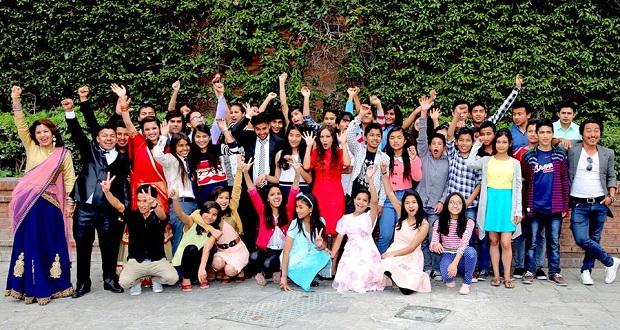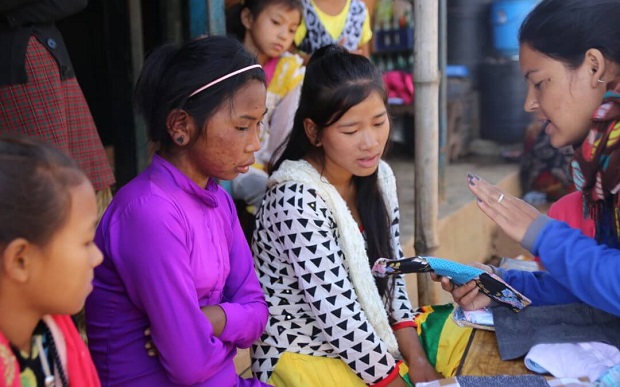Below is our recent interview with Bruce Keenan, President of Himalayan Children’s Charities:
Q: Could you provide our readers with a brief introduction to Himalayan Children’s Charities?
A: HCC was founded in 2000 to help orphaned, abandoned and disadvantaged children in Nepal through quality education. As our organization has grown, we have worked to create an environment that nurtures our students and provides the mentorship and life-skills training that children would usually receive from their family.
Today HCC supports 140 students in Nepal through three programs. The Signature Program students attend quality boarding school during the school year and spend holidays at the HCC youth home in Nepal’s capital, Kathmandu. The Higher Education Program provides university scholarships for disadvantaged students for college, technical school or university. The Rural Education Scholarship Program provides educational scholarships to students affected by the devastating earthquakes in 2015 and allows these children to remain in school and with surviving family.
What sets us apart from other organizations is our commitment to each student; we help nurture and grow the whole person with the goal of creating well-rounded adults who are independent, successful and dedicated to giving back to their communities.
 Recommended: ERA Helps Organizations Manage Their Retiring IT Assets Safely And Responsibly
Recommended: ERA Helps Organizations Manage Their Retiring IT Assets Safely And Responsibly
Q: Bruce, tell us more about how you started. How did you get the idea for HCC?
A: In 1999, I went trekking in Nepal for the first time and saw kids as young as six years old working. These children had been abandoned by their parents and were forced to work to survive. I knew I could do something to help. After visiting an orphanage in Kathmandu, my wife and I began sponsoring two orphaned sisters, Nari and Chet. Our connection to these special girls was immediate. But it was a gentle suggestion from Nari, “Could our friends come with us?” that changed everything. Two became four, then eight and within 10 years we were supporting almost 50 children.
In 2015 a series of earthquakes devastated large rural areas of Nepal. We were called to action again, and began supporting the education of children in the worst affected areas, where even a little help goes a very long way. Since we started, 20 years ago, we have directly supported over 200 remarkable Nepali children and young adults.
Q: Why is support of Nepali orphans so critical?
A: The Nepali orphan crisis is complex. Nepal is one of the poorest countries in the world, and the poverty is so severe in some places that uneducated parents are forced to abandon their children in orphanages in hopes that they will survive. Dangerous physical labor, poor nutrition, and a lack of medical care leaves many children without parents at all. A 10-year long civil war and the deadly 2015 earthquakes exacerbated an already troubling situation and orphaned many more children. Additionally, children, girls in particular, are especially vulnerable to human trafficking; there are estimates that every year five to ten thousand women and girls are trafficked to India alone.
Critical is really the right word to use. Giving the children in our programs a way out of poverty and keeping them safe from trafficking is critical. Being able to offer them education, love and mentorship is critical, and we are very grateful to everyone that helps and supports us to change these children’s lives.
Q: Can you tell us something about your mentorship & education programs?
A: The core of our programs is to provide quality education to children. In Nepal the majority of children will only finish 8th grade, and this drops even lower when considering children who are impoverished or without a family. Education, especially through university, is life changing and provides children with the opportunity for a bright future.
We realized soon after starting HCC, that for a child to become a successful adult they need guidance and support, in addition to education. We have worked to build a stable and nurturing environment for these children and to create programs that give them the tools they need to succeed and thrive. Mentorship fosters self-awareness, guiding students to discover their inner talents, strengths, and interests. They are taught life skills, including budgeting, house management, cooking, and are introduced to team building and leadership training.
At the same time, we teach the importance of philanthropy and giving back. We guide our students to use their unique experiences to help uplift others and support the improvement of their local communities.
 Recommended: BeliaIsza Is An Upcoming Fashion Technology Brand Dedicated To Empowering Women Through Fashion And Philanthropy
Recommended: BeliaIsza Is An Upcoming Fashion Technology Brand Dedicated To Empowering Women Through Fashion And Philanthropy
Q: What is the best way to help?
A: The best way to help is to donate. HCC is funded almost entirely by donations from individuals. All donations, no matter how big or small, help us to support these remarkable kids. For as little as $25 a month you can sponsor one of our rural students, keeping them in school and safe from human trafficking or forced labor.
Another great way to help is to fundraise for HCC. Many of our supporters have been very successful in raising funds for HCC through charity runs, small events and Facebook birthday fundraisers. And lastly, following us on social media is a great way to show support and spread the word about our charity with friends and family. You can follow us on Facebook, Instagram and Twitter @hccnepal or visit our website at www.hccnepal.org to donate.
Q: What are your plans for the future?
A: Going forward, we are focusing on our Higher Education Scholarship Program. Other non-profits working with orphaned and abandoned kids in Nepal, end their support at ages 16 or 18. Few focus on what happens next. At present there are no student loans, few scholarships from universities based on income and some universities require the full four year tuition upfront. This makes obtaining higher education almost impossible for students from disadvantaged backgrounds.
Our program covers all the costs for higher education – tuition, books, uniforms, room and board – and has been very successful. Ten of twelve students have graduated the program with Bachelor’s degrees, one with a Masters in Pharmacology and all are now employed. Eleven more students are currently enrolled in university. Several graduated students also started their own non-profit, HCC-Nepal, and are now helping other orphaned children in positions they were once in. It is such a wonderful reward to see our students accomplish so much, and with education and mentoring programs, we plan to continue helping youth in Nepal to elevate their world.
Activate Social Media:


